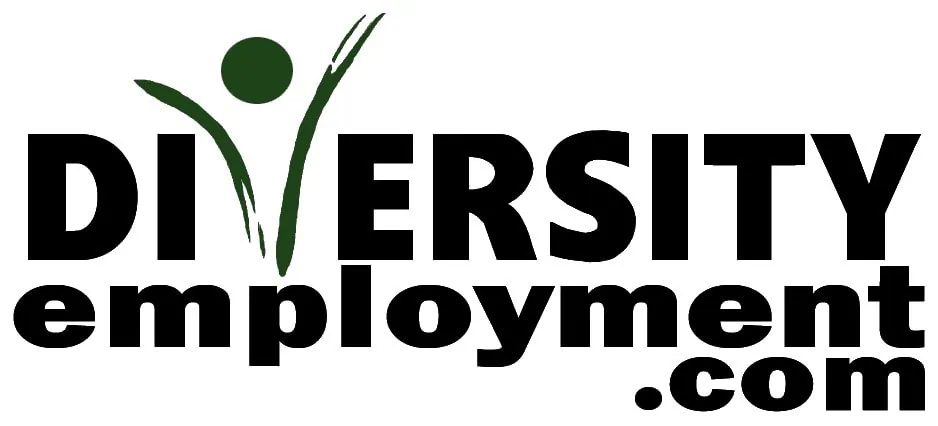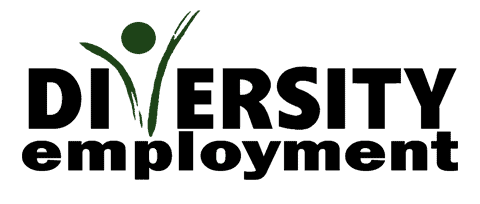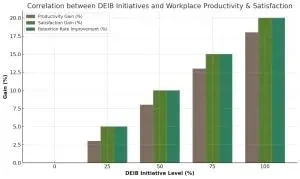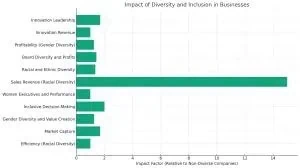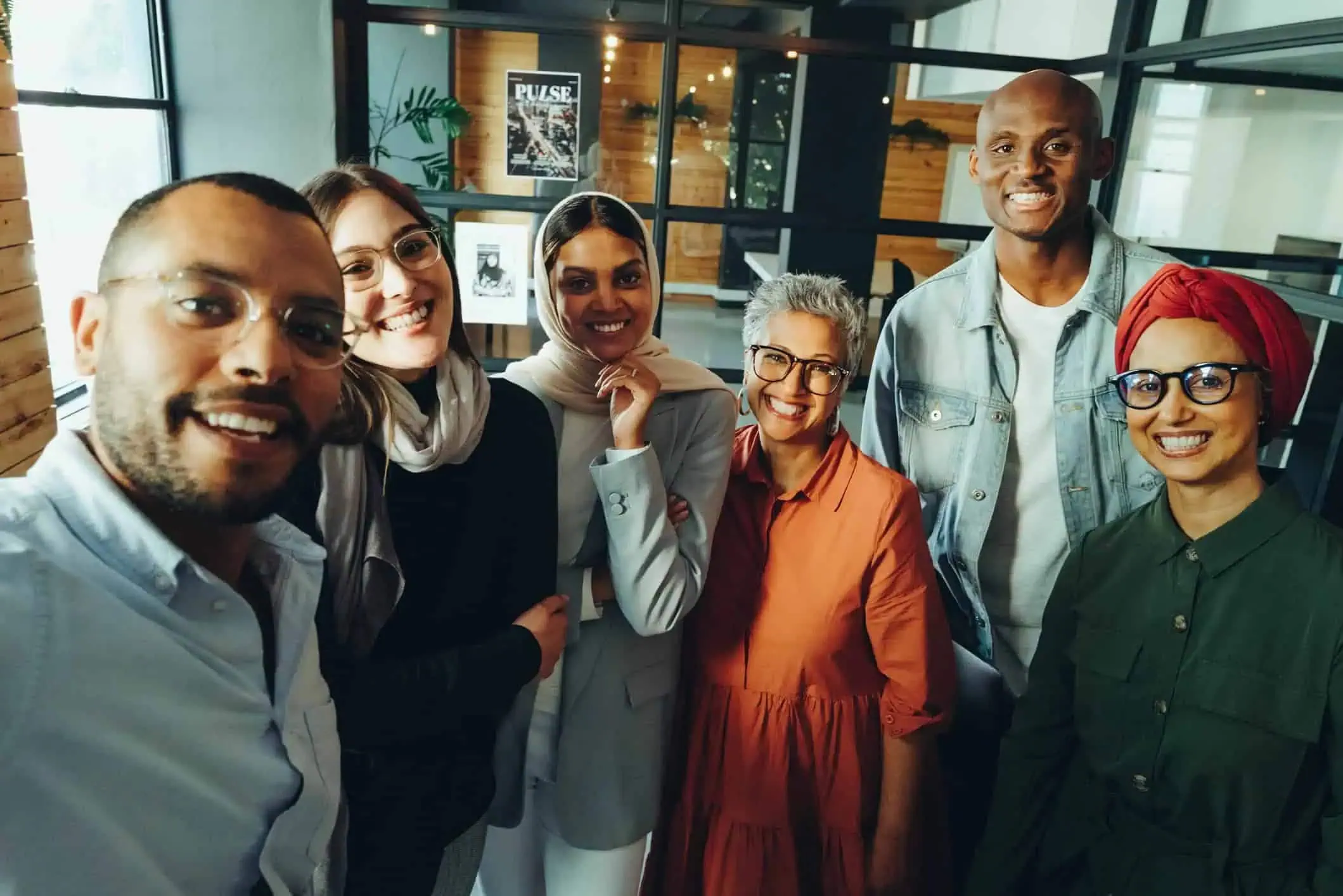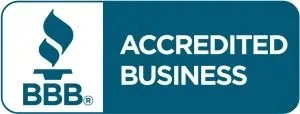
The Ultimate Guide to Hire Diversity
Introduction
Welcome to the Ultimate Guide to Hire Diversity! This guide is a comprehensive and forward-thinking exploration of the ever-evolving landscape of diversity and inclusion in the modern workplace. Embracing diversity across race, gender, age, ability, and sexual orientation is crucial in today’s world, and we are excited to provide you with a valuable resource to help you achieve this goal.
Our guide is not just a resource, but a beacon for job seekers and employers alike. We aim to expose the path toward a more inclusive, creative, and dynamic professional world. By exploring the benefits, strategies, and real-world impacts of diversity in the workplace, we hope to inspire individuals and companies to embrace this multifaceted concept for unprecedented growth and success.
When you search for “Hire Diversity,” we know you are looking for a career with a company that values you. Your individuality, unique perspectives, and experiences can bring new light to that position you’ve been dreaming of. Let’s find a place to shine bright and find that perfect match when you search for hire diversity.
Embracing all Facets of Diversity
Diversity extends beyond the typical considerations of race and gender. It encompasses a range of human differences, including age, experiences, talents, skills, and opinions. In a workplace setting, diversity refers to employees with varied backgrounds and perspectives contributing to a richer pool of ideas, fostering creativity, and driving innovation.
The Importance of Each Aspect of Diversity
- Cultural and Racial Diversity: A diverse workforce represents multiple cultures and races, which enriches the workplace environment. It allows for a deeper understanding of different perspectives and customs, fostering an inclusive environment. Black workers, for instance, highly value racial and ethnic diversity, with 53% considering it extremely important in their workplace.
- Gender Diversity: Gender diversity is crucial for a balanced workplace. Studies show that organizations with gender diversity perform better, make more informed decisions, and experience increased profitability.
- Age Diversity: Bringing together employees of different ages adds a wealth of experience and knowledge. It allows cross-generational mentorship and learning, creating a more dynamic and versatile workforce.
- Ability Diversity: Including people of varied abilities enriches the workplace. It challenges ableist assumptions and practices and promotes a culture where everyone’s contribution is valued equally.
- Sexual Orientation: A mix of employees with different sexual orientations fosters a more inclusive and understanding work environment. Companies must recognize and celebrate this diversity, as it reflects our society.
The Benefits of a Diverse Workforce
- Innovation and Creativity: A diverse team brings together different perspectives, fostering creativity and leading to innovative solutions.
- Improved Decision-making and Problem-solving: Diverse perspectives enable a more comprehensive analysis of problems, leading to better decision-making and more effective solutions.
- Market Expansion: A workforce that mirrors the diversity of customers can better understand and cater to varied customer needs and preferences.
- Employee Engagement: Diversity and inclusion practices contribute to a positive workplace culture, enhancing employee engagement and satisfaction.
- Reduced Turnover and Increased Retention: A Catalyst poll found that 35% of employees’ emotional investment in their work is connected to their feeling of inclusion.
Hire diversity isn’t just a phrase, but a moral imperative; it’s a strategic necessity for modern businesses to attract talent like you. A diverse workforce leads to a more dynamic, innovative, and successful organization. By acknowledging and valuing the unique contributions of each employee, regardless of their race, gender, age, ability, or sexual orientation, businesses can create a genuinely inclusive and prosperous workplace that will allow anyone with the skills to shine bright.
Implementing Inclusive Policies and Practices
Companies that hire diversity actively embrace inclusivity by broadening their understanding of diversity. This includes acknowledging and embracing differences in race, ethnicity, gender, background, experiences, perspectives, and abilities. Practical strategies to encourage an inclusive workplace include prioritizing diversity and inclusion in recruitment, providing equal access to development opportunities, promoting continuous learning, and establishing clear policies for conflict resolution. These practices help create a workplace culture where diverse talents can thrive, driving innovation and building a more resilient workforce.
Emerging Trends in Inclusivity
- Evolving Remote Workforce: The remote work model remains prevalent, solidified by the COVID-19 pandemic. Companies are working to minimize the challenges of this model, such as disparities in living conditions, access to resources, and work-life balance, especially for working women.
- Diverse Gender Identity and Expression: Increasing awareness and inclusivity regarding diverse gender identities and expressions are evident. Organizations are adopting practices like gender-neutral restrooms, inclusive health benefits for transitioning individuals, and understanding inclusive language.
- Multigenerational Workforce: Today’s workforce spans multiple generations, bringing unique perspectives and experiences. Embracing this diversity can lead to more robust problem-solving and decision-making processes.
Case Studies and Industry Recognition
- Eaton: This company was recognized for its commitment to inclusivity by earning a perfect score on the Human Rights Campaign Foundation’s Corporate Equality Index and being named one of America’s Greatest Workplaces for Diversity by Newsweek. These honors underscore Eaton’s successful efforts to create an inclusive environment for all employees, particularly in the LGBTQ+ community.
- Human Rights Campaign Foundation’s Corporate Equality Index: The CEI highlights organizations implementing inclusive policies and benefits. For instance, 97% of CEI-rated employers include “sexual orientation” and “gender identity” in their nondiscrimination policies. Additionally, many of these businesses offer transgender-inclusive plan options and have employee resource groups or diversity councils that include LGBTQ+ and allied employees.
Benefits of Inclusivity for Organizations
Inclusivity is not just beneficial for you; it also brings significant advantages to organizations. More often than not, diverse companies outperform non-diverse ones in creativity, problem-solving, and brand reputation. Additionally, advancing an inclusive environment helps recruit and retain talent, considerably reducing employee absenteeism. For example, a study by American Progress revealed that two million Americans leave their jobs annually due to unfairness and discrimination. At the same time, a Catalyst poll found that 35% of employees’ emotional investment in their work is connected to their feeling of inclusion.
Inclusivity in the workplace is more than just a buzzword; it’s a critical component of modern organizational strategy. By implementing inclusive policies and practices, companies ensure fairness and equality for all employees and power the diverse talents and shining perspectives they bring. This leads to a more innovative, competitive, and successful organization.
Creating a Workplace for Everyone
Understanding the importance of Diversity, Equity, Inclusion, and Belonging (DEIB) in the workplace is crucial for all. Here’s why inclusive policies and practices are not only beneficial for traditionally underrepresented groups but also for you, regardless of your background.
Inclusive Recruitment and Hiring
Organizations are increasingly focusing on inclusive hiring practices. This means they seek to create diverse teams that reflect a broad spectrum of experiences and perspectives. As a job seeker, this approach can offer you an equitable opportunity to showcase your skills and potential, irrespective of your background. Companies prioritizing DEIB are likely to provide a fair and unbiased recruitment process.
Continuous Learning and Professional Development
Companies committed to DEIB understand the importance of continuous learning and professional development for all employees. This includes training that addresses unconscious bias microaggressions and promotes inclusive communication. As a job candidate, look for companies that offer such learning opportunities, as they indicate a commitment to personal and professional growth for all employees.
Culture of Belonging
A workplace prioritizing belonging ensures that every employee feels valued and integral to the team. This aspect of DEIB goes beyond inclusion, creating an environment where you can feel a deep connection and engagement with your work and colleagues. Companies that can create a sense of belonging tend to have higher employee satisfaction and retention rates.
Benefits Beyond Moral Obligation
Companies with strong DEIB practices often outperform others in various aspects, including creativity, problem-solving, and understanding of consumer interests. For job seekers, this can mean working in an environment that’s not only ethically sound but also dynamic, innovative, and successful.
Enhanced Employee Experience and Satisfaction
Inclusive workplaces tend to offer a better overall employee experience. This includes fair treatment, equal advancement opportunities, and a supportive work environment. As a job seeker, finding a company aligning with these values can significantly impact your job satisfaction and career trajectory.
When searching for your next opportunity, consider the DEIB practices of potential employers. Companies that genuinely invest in these areas will likely provide you with a more supportive, dynamic, and fair work environment, which can be crucial for your professional growth and job satisfaction. Keep an eye out for organizations that talk about DEIB and demonstrate it through their actions and policies.
Cultivating and Assessing Diversity in the Workplace for HR Professionals
Hire Diversity: Strategies for HR Professionals
- Unbiased Recruitment Processes: Building a diverse workforce begins with an unbiased recruitment process. Strategies like blind resume screening, standardized interview questions, and AI tools for initial resume screening can help mitigate unconscious bias. Regularly assessing and revising recruitment processes ensures they remain fair and inclusive.
- Inclusive Job Descriptions: Write job descriptions that are inclusive to all candidates. Avoid gender-coded language and clearly express your organization’s commitment to diversity and inclusion. Highlighting flexible working arrangements can also appeal to a broader range of candidates.
- Hire Diversity Panels: Using diverse hiring panels helps ensure fairness in the recruitment process and demonstrates the organization’s dedication to diversity.
- Welcoming Workplace Culture: Beyond hiring, cultivate a workplace culture that values and respects all employees. This can be achieved through team-building activities, celebrating diverse holidays, and encouraging open dialogue about different cultures.
- Continuous Training and Development: Implement training programs focused on inclusivity and cultural competence, including workshops on unconscious bias and cultural sensitivity.
- Employee Resource Groups (ERGs): Support the formation of ERGs to provide a voice for underrepresented groups and serve as a resource for understanding diverse employee needs.
- Monitoring and Measuring Progress: Track the effectiveness of diversity initiatives through regular surveys, feedback mechanisms, and diversity metrics in hiring, promotions, and retention.
- Inclusive Leadership Development: Encourage leaders to practice inclusive leadership, which involves being aware of biases, seeking diverse perspectives, and creating an environment where every team member feels they belong.
Assessing the Impact: Enhancing Diversity Initiatives
- Establishing Goals for Diversity and Inclusion: Set clear, measurable goals aligned with the organization’s values and mission. SMART goals are effective in monitoring and measuring progress toward diversity and inclusion.
- Tracking Key Diversity Metrics: Assess the impact of diversity initiatives by monitoring metrics related to organizational indicators of inclusion, employee life cycle and experience, customer experience, financial performance, and human capital indicators of inclusion.
- Data-Driven Strategies: To refine DEI strategies, use data on diversity representation, employee satisfaction, and engagement. This includes feedback from employees about their engagement and views on inclusion.
- Conducting Hire Diversity Audits: Regular diversity audits help understand the current state of DEI in the organization, revealing disparities and areas for improvement.
- Leveraging Employee Feedback: Employee feedback is vital in assessing the effectiveness of DEI initiatives. Surveys, interviews, and focus groups provide valuable insights.
- Ensuring Pay Equity and Accessibility: Analyze pay equity to ensure fair compensation across demographic groups and track the utilization of workplace accommodations.
- Transparency in Reporting: Maintain transparency in reporting the progress and challenges of DEI initiatives to all stakeholders, including findings from pay equity analyses and diversity audits.
For HR professionals, creating and sustaining a diverse, high-performing workforce involves strategic recruitment, cultivating an inclusive workplace culture, and a data-driven approach to assessing and enhancing diversity initiatives. Implementing these strategies effectively can lead to a more equitable and prosperous organization.
Stories of Success: Diversity in Action
Exploring real-life success stories of diverse individuals across various industries reveals how their unique backgrounds and perspectives have significantly contributed to their success and the success of their teams and organizations. These success stories emphasize that diversity and inclusion are ethical imperatives and strategic business advantages. They highlight the importance of different perspectives in problem-solving, innovation, and understanding diverse markets, ultimately leading to increased profitability and business growth.
Diversity and Inclusion Initiatives in the Workplace
Various professionals have implemented successful diversity and inclusion initiatives, such as creating a culture of belonging and equity, involving diverse voices in projects, and using technology to enhance diversity. For instance, Nancy Wang Yuen, a Managing DEI Consultant, emphasized the importance of fostering open dialogue, establishing employee resource groups, and ensuring diverse representation in decision-making processes. Similarly, Amar Ghose, CEO of ZenMaid, highlighted the significance of celebrating diversity through cultural events and leveraging technology for inclusive recruitment practices Lead Grow Develop.
The Impact of Workplace Diversity
Real-world stories from employees in diverse environments on Emtrain showcase the benefits of teams comprising people who think differently. This diversity leads to faster problem-solving with more creative solutions. However, these stories also reveal issues such as bias in recruiting, team dynamics, and career advancement, highlighting the importance of awareness and proactive measures to create a healthy workplace culture.
Success in Neuroscience
The National Institute of Neurological Disorders and Stroke (NINDS) features stories of successful neuroscientists from diverse backgrounds. These individuals, like Susan Marino, Ph.D., and Cassie Mitchell, Ph.D., have used programs such as the Predoctoral NRSA Fellowship and the NINDS Faculty Development Award to advance their careers, showcasing the benefits of companies that hire diversity in scientific research.
Autism in the Workplace
Individuals with autism have made remarkable strides in various careers, demonstrating the transformative power of inclusive employment practices. Notable figures like Temple Grandin, Daryl Hannah, Dan Aykroyd, and Tim Ellis have thrived in their respective fields, breaking barriers and challenging societal perceptions about autism FAU CARD.
Business Benefits of Diversity
Companies like Clorox and Marriott International have seen tangible benefits from their diversity and inclusion programs. Clorox’s IDEA program resulted in a positive employee response to inclusion, while Marriott’s inclusive culture contributes to high performance. Studies by Deloitte and McKinsey & Company also found a correlation between diversity and higher business performance Namecoach.
Bring Your Whole Self to Work
Your individuality is an asset in your career. Understanding, embracing, and articulating your individuality can help you shine bright:
- Understanding Personality and Career Alignment: Personality traits can significantly influence job satisfaction and performance. Knowing your personality type can help you find suitable roles. For instance, extroverts might thrive in dynamic, people-oriented roles, while introverts might excel in positions that require focus and independent work. Understanding this alignment can lead to more fulfilling career choices Psychology Today.
- The Importance of Person-Job Fit: Person-job fit emphasizes aligning your skills, values, and personality with the job’s requirements. A good fit can lead to higher job satisfaction and better performance. As a job seeker, evaluating potential roles and companies is beneficial to ensure they align with your personal and professional preferences. This approach can lead to a more satisfying and successful career Oboloo.
- Benefits of Individuality in the Workplace for Job Seekers: As a job seeker, look for workplaces that respect and celebrate individuality. Such environments will likely offer a stronger sense of belonging, inspire creativity, and foster collaboration. During your job search, inquire about a company’s culture and initiatives regarding diversity and individual expression. Workplaces that encourage employees to bring their whole selves to work tend to have higher employee satisfaction and engagement Humi’s blog.
- Promoting Individuality for Job Seekers: Many workers feel the need to downplay their identities at work. As a job seeker, you should look for organizations that create a safe, welcoming, and inclusive work environment. This ensures that you can be authentic, leading to better job satisfaction and mental health. While evaluating job opportunities, consider how companies promote individuality and hire diversity in their teams Grokker.
FAQ’s
What is the scope of diversity mentioned in the article?
The article covers a wide range of diversity aspects including cultural and racial diversity, gender diversity, age diversity, ability diversity, and sexual orientation, highlighting their importance in a dynamic workforce.
What are the benefits of a diverse workforce?
A diverse workforce leads to innovation, creativity, better decision-making, market expansion, higher employee engagement, and reduced turnover, thereby enhancing overall organizational performance.
What are some key inclusive policies and practices for companies?
Inclusive policies include unbiased recruitment processes, diverse hiring panels, continuous training and development, supportive employee resource groups, and transparent reporting on DEI initiatives.
How does diversity impact problem-solving and decision-making?
Diverse teams bring various perspectives, leading to more comprehensive problem analysis, creativity in solutions, and improved decision-making processes.
Why is inclusivity important for job seekers?
Inclusivity is crucial for job seekers as it ensures fair treatment, equal opportunities, and a supportive work environment, leading to greater job satisfaction and career growth.
Conclusion
Your unique experiences, skills, and perspectives are invaluable assets in today’s diverse workforce. Companies that embrace diversity and inclusivity don’t just create a fairer and more equitable workplace; they build environments that foster innovation, creativity, and growth. Inclusive workplaces value every voice, including yours.
In your quest for the right job, prioritize companies that demonstrate a genuine commitment to diversity and inclusion. These are the organizations where you can thrive, grow, and contribute to a collective success that celebrates every individual’s contribution. Also, your search for hire diversity is not just about finding a job; it’s about discovering a community and a culture where you can shine brightest.
Let these values of diversity and inclusivity guide your job search. Find a home where your talents are nurtured, your contributions are valued, and your career can soar. This is the future of work—where everyone belongs, contributes, and thrives.
A Bright Future Awaits in Diverse Workspaces
For job seekers and professionals alike, this is your moment to align with organizations that value and celebrate diversity in all its forms. Be a part of a progressive movement towards a more inclusive and vibrant work culture. Join us in this journey of transformation and empowerment. Join Diversity Employment today to discover your place in a workplace where your uniqueness is not just accepted, but celebrated.
